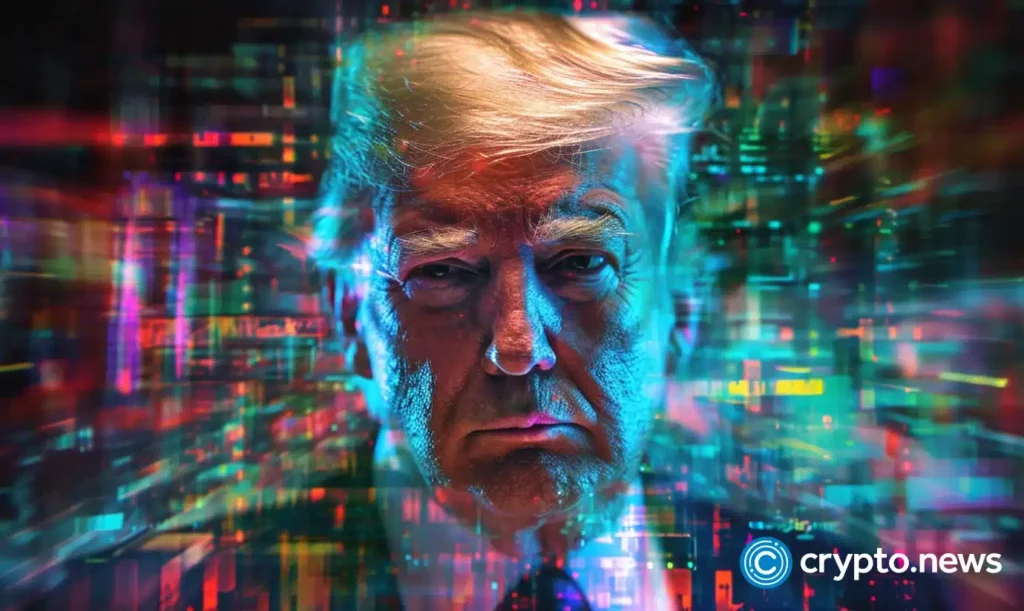Introduction to the New Political Landscape
The re-election of President Trump marks a pivotal moment in the American political landscape, ushering in a new phase characterized by heightened anticipation regarding his future policies. As the nation grapples with its economic challenges, the direction taken by Trump’s administration is expected to not only shape national discourse but also influence global economic trends. A key area of focus is the growing prominence of cryptocurrencies, which have started garnering considerable attention as alternative assets amid volatility in traditional markets.
During Trump’s previous term, we observed significant fluctuations in economic conditions, driven in part by the administration’s policies. This time, as he embarks on his second term, stakeholders and investors across various sectors are keenly watching how fiscal and regulatory measures will evolve. Trump’s approach toward issues like trade, taxation, and digital innovation could fundamentally alter the framework under which cryptocurrencies operate. The president’s previous inclination towards deregulation suggests that his policies may further stimulate technological advancements and, in doing so, bolster the cryptocurrency market.
Moreover, public sentiment surrounding cryptocurrencies is rapidly changing, with a growing number of individuals recognizing the potential for financial liberation that decentralized currencies offer. In tandem with Trump’s presidency, it is not unreasonable to surmise that cryptocurrencies may find themselves enmeshed within broader economic narratives, becoming more mainstream as the administration’s policies promote technological adoption. The implications for both investors and the general population are profound, as such shifts have the potential to reshape economic participation and wealth distribution.
As we navigate through this complex political landscape, it is essential to consider how Trump’s administration could impact the trajectory of the cryptocurrency market, influencing not only investment decisions but also the emergence of new financial paradigms.
The Friendship Between Trump and Musk
The relationship between President Donald Trump and Tesla CEO Elon Musk has drawn significant interest from political analysts and the tech community alike. Their friendship, characterized by mutual respect and shared ambitions, has the potential to influence a variety of policy decisions, particularly those surrounding technology and innovation. As both figures are prominent in their respective fields, the intersection of their interests could greatly impact the development of emerging industries, including cryptocurrency.
President Trump’s previous administration made headlines with its stance on technology deregulation and innovation, which resonated with Musk’s advocacy for the advancement of sustainable energy and electric vehicles. This alignment could facilitate a collaborative approach towards creating favorable regulatory frameworks that promote technological advancements. Musk’s influence in the tech sector positions him as a key player who can sway public opinion and encourage policy shifts that are advantageous for the cryptocurrency landscape.
Furthermore, Elon Musk has been a vocal supporter of various cryptocurrencies, particularly Dogecoin, which has fueled debates on the legitimacy and future of digital currencies. His relationship with Trump may provide a unique platform for discussing cryptocurrency regulations, taxation, and overall acceptance within the economy. Should they align on particular policies, there might be significant implications for entrepreneurs and investors in the crypto space.
Moreover, Trump’s potential second term presents an opportunity for both men to collaborate more closely on technology initiatives that could include blockchain and other revolutionary advancements. The integration of their visions could lead to a more innovative, regulation-friendly environment for crypto assets and technological breakthroughs. As the friendship continues to evolve, the outcomes will likely play a crucial role in defining the future landscape of both the tech world and the cryptocurrency arena.
Understanding Cryptocurrency Basics
Cryptocurrency refers to a form of digital or virtual currency that utilizes cryptography for security. Unlike traditional currencies issued by governments, such as the US dollar or the euro, cryptocurrencies operate on decentralized networks based on blockchain technology. A blockchain is a distributed ledger that records all transactions across a network of computers, ensuring transparency and security without the need for a central authority.
There are thousands of different cryptocurrencies, but the most well-known among them is Bitcoin, created in 2009. Other notable cryptocurrencies include Ethereum, which allows for smart contracts, and Ripple, known for its digital payment protocol. Each type of cryptocurrency serves unique purposes and functions within the digital economy. While Bitcoin serves as a store of value and medium of exchange, Ethereum’s capabilities extend to decentralized applications and financial systems.
The functionality of cryptocurrencies is predicated on key features that distinguish them from traditional finance. Firstly, the limited supply of many cryptocurrencies, such as Bitcoin, contributes to their value retention and inflation resistance. Secondly, transactions made with cryptocurrencies can often be conducted anonymously, appealing to users who prioritize privacy. Additionally, the global reach of cryptocurrencies transcends borders, enabling cross-border transactions without the typical delays or fees associated with conventional banking services.
In today’s economy, cryptocurrencies have gained significant attention from investors, financial institutions, and even governments. Their relevance is underscored by the increasing acceptance of cryptocurrencies as legitimate forms of payment and investment. With the rise of decentralized finance (DeFi) and non-fungible tokens (NFTs), cryptocurrencies have carved a niche in diverse sectors, from art to real estate. Thus, understanding the basic principles of cryptocurrencies is essential for navigating this evolving landscape.
Cryptocurrency as a Tool for Success
In recent years, cryptocurrency has emerged as a powerful instrument for wealth creation and financial empowerment. Many individuals and businesses have recognized the transformative potential of digital currencies, harnessing their unique attributes to drive success. From investment opportunities to innovative payment solutions, cryptocurrency serves as a multifaceted tool for achieving financial growth.
One notable aspect of cryptocurrency is its potential for high returns. Early investors in Bitcoin, for instance, have witnessed remarkable appreciation in their assets, often resulting in life-changing financial outcomes. The volatility of the cryptocurrency market can be intimidating; however, with informed trading strategies and a deep understanding of market trends, savvy investors have capitalized on these fluctuations, effectively increasing their fortunes. This volatility, while presenting risks, also offers unique opportunities for profit that traditional markets may not provide.
Additionally, businesses are beginning to leverage cryptocurrency to streamline operations and enhance profitability. Accepting cryptocurrencies as a form of payment allows companies to reach a broader customer base and reduce transaction costs associated with traditional banking systems. Companies like Tesla and Starbucks are setting precedents by integrating crypto payments, showcasing the feasibility and benefits of adopting this contemporary transaction method. Furthermore, engaging in blockchain technology can enhance transparency and security within business operations, appealing to a more discerning consumer base.
While success stories abound, it is essential for individuals to approach cryptocurrency investment with caution. Conducting thorough research, employing risk management techniques, and remaining adaptable to market changes are vital strategies for navigating this dynamic landscape. The potential for cryptocurrency to serve as a tool for success cannot be overstated, providing opportunities for personal and professional growth in an increasingly digital economy.
The Entertainment Value of Crypto
The intersection of cryptocurrency and entertainment has become increasingly prominent, capturing the attention of a diverse audience. One of the most notable trends in this realm is the rise of meme coins. These digital currencies, often inspired by internet jokes and trends, have achieved cult-like followings, drawing in both seasoned investors and casual users. The humor and relatability of these currencies, such as Dogecoin and Shiba Inu, have turned them into phenomena that transcend the typical investment landscape, transforming financial speculation into a form of entertainment.
Moreover, non-fungible tokens (NFTs) have revolutionized the art world, providing creators with innovative platforms to monetize their work. Digital artists and musicians can sell unique pieces directly to fans, fostering an artistic community that thrives on exclusivity and authenticity. The thrill of owning a piece of digital art or a collectible tied to a prominent event or personality has captured the imagination of many, turning the NFT market into a spectacle that blends commerce with culture. Famous figures, from athletes to celebrities, have entered this space, further amplifying its appeal and contributing to the ongoing conversation around digital ownership and value.
The cultural implications of cryptocurrency are also profoundly noteworthy. Crypto culture is characterized by its vibrant community and dynamic discourse, often reflected in online forums, social media, and events. The values of decentralized finance and the pursuit of financial independence resonate with many, making cryptocurrency a symbol of empowerment and rebellion against traditional financial systems. As cryptocurrency continues to embed itself in the entertainment industry, its influence spans beyond economics, reshaping narratives and engaging audiences in an ever-evolving landscape. This intersection of currency, culture, and entertainment is poised to redefine how we perceive both art and investment.
Risks and Challenges in the Crypto Space
Investing in cryptocurrency presents a unique set of risks and challenges that caution investors in today’s volatile environment. Market volatility is perhaps the most significant concern. Unlike traditional financial markets, cryptocurrency prices can fluctuate dramatically in short periods, sometimes within hours or minutes. This extreme price movement can lead to substantial financial losses if trades are not executed strategically or if investors panic. Consequently, potential investors should stay informed about market trends and develop a robust risk management strategy to protect their investments.
Regulatory uncertainty is another substantial hurdle within the crypto landscape. As governments around the world grapple with establishing frameworks for cryptocurrency trading and usage, regulations can shift quickly and unpredictably. These changing regulations can impact the legality of certain transactions or the operating conditions of cryptocurrency exchanges, prompting fears about compliance and the overall stability of the market. Investors must remain vigilant and ensure they are informed about the legal implications of their investments. Following developments in legislation, often guided by significant political events and shifts in policy, can help mitigate the risks associated with such regulatory changes.
Security issues pose an additional layer of risk for crypto investors. The decentralized nature of cryptocurrencies, while beneficial, leaves them vulnerable to hacking and scams. Security breaches have resulted in significant financial losses for many investors. It is crucial to apply best practices for protecting digital assets, such as utilizing hardware wallets, enabling two-factor authentication, and staying aware of phishing attempts. Ultimately, while the potential for profit in the crypto space is high, acknowledging these risks and challenges—and taking proactive measures to address them—can bolster an investor’s chances of navigating through this complex landscape effectively.
The Future of Crypto Under Trump’s Administration
The intersection of cryptocurrency and politics is a dynamic space, particularly as we consider the implications of Donald Trump’s potential second term. In this context, one must examine the regulatory landscape and the policies that may be enacted that could directly influence the trajectory of cryptocurrencies. Historically, Trump’s administration has shown a mix of skepticism and support for digital currencies, with a strong inclination towards promoting traditional financial systems.
Looking forward, there is speculation regarding the introduction of clearer regulations. These regulations could aim to provide a framework that both protects investors and maintains national security. Clearer compliance guidelines could foster a more trusting environment for crypto enthusiasts and institutional investors alike. However, the possibility exists that with increased regulation, certain cryptocurrencies may face restrictions that could hinder innovation and growth. This is an important consideration for anyone involved in the cryptocurrency space.
Additionally, Trump’s administration may continue to engage with international markets, impacting how U.S. regulations align or conflict with crypto policies in other nations. The global nature of cryptocurrency means that U.S. policy will likely ripple beyond its borders, influencing international trading practices and collaboration in blockchain technology. Moreover, initiatives aimed at encouraging technological innovation could surface, potentially leading to public and private partnerships that will help propel the industry forward.
Overall, Trump’s administration is poised to either cultivate a favorable environment for cryptocurrencies or impose hurdles that may challenge their use and acceptance. As stakeholders monitor the situation, it is essential to stay informed about potential policy changes and their implications, paving the way for strategic adjustments in engagement and investment within the cryptocurrency landscape.
Learning and Educating Yourself About Crypto
In an era where cryptocurrencies have gained significant traction, educating oneself about this innovative financial landscape is paramount. The dynamic nature of cryptocurrencies necessitates that both novice investors and seasoned traders understand the fundamental principles that govern the market. By investing time in learning, individuals can make informed decisions that may lead to successful investments and increased financial literacy.
There are various resources available for those interested in building their knowledge base. Books such as “The Bitcoin Standard” by Saifedean Ammous and “Mastering Bitcoin” by Andreas M. Antonopoulos offer foundational insights into the origins and mechanics of cryptocurrency. These texts provide clarity about underlying technologies and economic implications, serving as excellent introductory materials for anyone new to the crypto space.
In addition to traditional literature, online courses have emerged as a popular means of gaining expertise. Platforms like Coursera and Udemy host courses designed by industry professionals covering various topics, from blockchain fundamentals to advanced trading strategies. These structured learning experiences can be particularly advantageous for individuals who thrive in guided environments.
Furthermore, engaging with communities can enhance one’s understanding. Numerous online forums, such as Reddit and specialized Discord servers, offer spaces for enthusiasts to share knowledge, ask questions, and discuss current trends in cryptocurrency. Participating in these discussions can expose newcomers to diverse perspectives while providing an opportunity to learn from seasoned traders and investors.
It is essential not to overlook the value of attending conferences and webinars. Many notable events are tailored to those keen on deepening their comprehension of cryptocurrency. Such gatherings often feature industry experts who present on the latest developments, making them invaluable for networking and knowledge-sharing.
Overall, education in the crypto realm is crucial for success. By leveraging a mixture of books, online courses, community engagement, and events, individuals can arm themselves with the knowledge required to navigate this complex and rapidly evolving sector effectively.
Conclusion: Making Your Own Choice
As we approach the potential realities of Trump’s second term, it becomes increasingly important for individuals to assess their financial landscapes and consider the implications of cryptocurrencies within that context. The discourse surrounding digital currencies has significantly evolved, becoming a central theme in the broader conversation about economic strategy and financial independence. With the ongoing volatility in global markets and the juxtaposition of traditional economic policies, the space occupied by cryptocurrencies offers both opportunities and challenges that merit careful examination.
The adaptability of cryptocurrencies to shifting political and economic tides underlines the necessity for personal choice when it comes to investing or abstaining from these digital assets. For some, embracing cryptocurrencies may represent a path toward enhanced financial freedom and diversified investment opportunities, particularly in an era marked by uncertainty. Conversely, others may find comfort in conventional investments, favoring stability over the perceived risks associated with cryptocurrencies. Such divergent views underscore the importance of individuals making informed decisions tailored to their unique circumstances.
As we have explored, understanding the implications of both political developments and technological innovations enables individuals to navigate the complexities associated with cryptocurrency investments. Engaging with reliable information and seeking counsel from financial advisors can further support informed decision-making. Ultimately, it is essential for each person to reflect upon their financial futures in light of current political realities and economic trends. The choice to embrace or eschew cryptocurrencies lies firmly in the hands of the individual, emphasizing the significance of personal agency in an increasingly dynamic financial environment.


